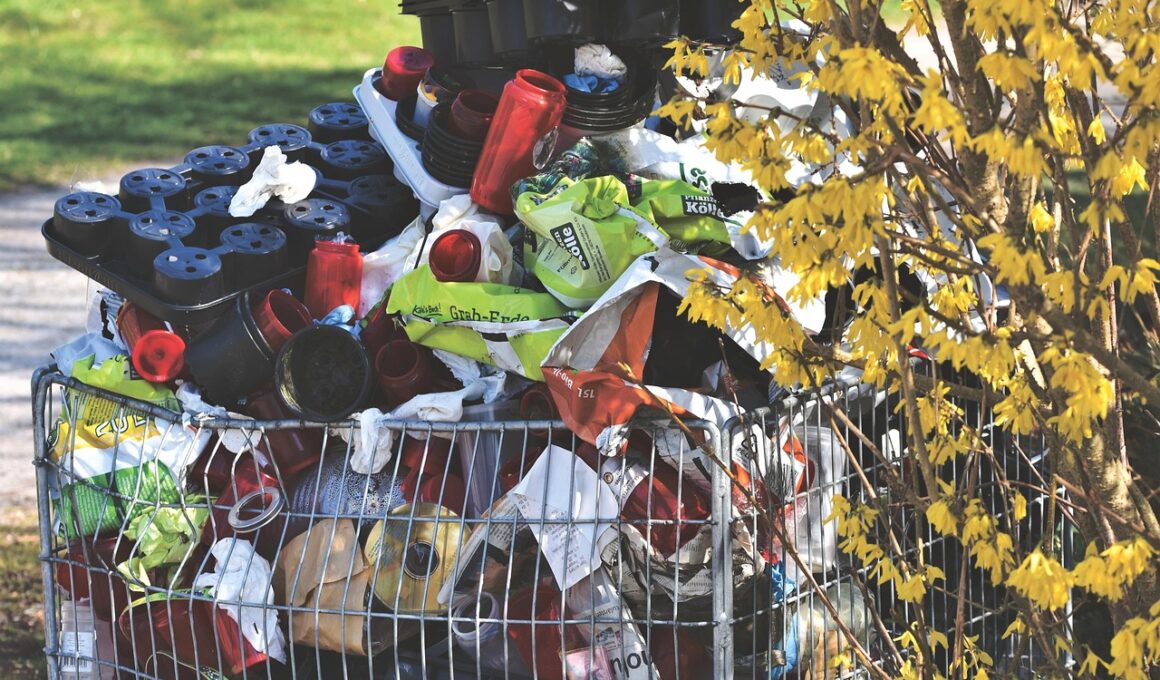How Waste Reduction Can Drive Profitability in Business
Waste reduction goes beyond just environmental benefits; it also represents a significant area of cost savings for businesses. By implementing effective waste management strategies, companies can enhance their profitability while contributing to a sustainable future. A focus on waste reduction helps to minimize the costs associated with disposal, as companies often face rising landfill taxes and fees. Additionally, businesses can experience a reduction in the cost of raw materials as they recycle or repurpose existing materials. Furthermore, organizations can improve their brand reputation, as customers are increasingly valuing sustainability efforts. Companies that actively engage in waste reduction strategies can differentiate themselves from competitors, attracting a loyal customer base. Moreover, waste reduction initiatives often lead to improved operational efficiencies, as businesses streamline their processes to minimize waste generation. In this way, organizations can not only save money but also reinvest those savings into growth strategies and innovation. As stakeholders demand higher standards in waste management, businesses that adapt will ensure their economic sustainability for the future. Ultimately, reducing waste is crucial in our modern economy, not just for corporate responsibility, but also for enhancing profitability.
Implementing waste reduction strategies can start with simple assessments. Identifying areas where waste is produced helps businesses determine specific targets for reduction. Techniques such as conducting waste audits will provide insights into operational inefficiencies, allowing companies to streamline their processes more effectively. Employees can be encouraged to participate in waste management initiatives, such as recycling programs and waste sorting. Offering training can be beneficial in fostering a culture focused on sustainability. Another effective strategy is to rethink product design by incorporating materials that are more easily recyclable or made from sustainable sources. Collaborating with suppliers can also lead to reductions in packaging waste, as businesses seek to minimize unnecessary materials in their supply chains. Leveraging technology and innovation can further enhance waste reduction efforts; for example, companies can explore digital solutions that enable better inventory management, reducing excess and outdated stock. Monitoring progress and making necessary adjustments are equally important in ensuring that waste reduction goals are met. As businesses witness the positive impacts of these strategies, they can inspire others in their industry to follow suit, creating a collaborative approach towards waste management. Ultimately, embracing change leads to long-term success.
The Financial Benefits of Waste Reduction
Understanding the financial benefits of waste reduction is essential for businesses seeking to enhance profitability. One major financial factor is the reduction in disposal costs; as waste is diminished, companies can see significant savings in what they pay for trash removal services. Moreover, avoiding penalties and fees associated with improper waste disposal reinforces the importance of an organized waste management program. Additionally, by reducing the amount of raw materials utilized, businesses can help decrease their operational costs. Recycling generates income as companies can sell usable materials instead of sending them to landfills. This not only allows for direct financial gains but also supports the entire recycling industry, fostering economic growth. Companies that adopt a proactive approach to waste reduction often find themselves positioned as industry leaders, benefiting from positive public relations. Furthermore, organizations may attract investors and customers who prioritize sustainability, which can lead to increased revenues and market share. By clearly communicating their waste reduction efforts, businesses create robust narratives that not only appeal to environmentally-conscious audiences but also elevate their overall corporate image. Profiting from waste reduction extends beyond financial aspects, creating a ripple effect of positive impacts throughout industries.
Incorporating waste reduction strategies not only benefits businesses but also encourages stakeholder engagement. Employees typically appreciate working for organizations dedicated to sustainability, resulting in improved morale and productivity. This, in turn, leads to decreased employee turnover, thereby reducing recruitment and training costs. Additionally, positive workplace cultures foster creativity and innovation, driving teams to develop groundbreaking solutions while reducing waste. Engaging customers in a company’s sustainability efforts can also enhance brand loyalty. Customers increasingly align themselves with brands that reflect their values and have a commitment to responsible environmental practices. Employing transparent communication strategies that highlight the organization’s waste reduction efforts can effectively increase consumer trust. Social media platforms and other digital outlets allow companies to share their successes and progress transparently, building an engaged community of supporters. Furthermore, partnering with local organizations can amplify these efforts, demonstrating social responsibility while increasing visibility in communities. By positioning their brands as champions of sustainability, businesses can recognize the importance of fostering relationships with stakeholders. Ultimately, aligning waste reduction initiatives with stakeholder interests leads to shared success, strengthening the organization’s position for long-term growth.
Creating a Waste Reduction Plan
Developing a waste reduction plan is crucial for achieving desired outcomes in waste management. A comprehensive plan should begin with a clear understanding of current waste generation practices. Setting realistic reduction goals allows businesses to track progress while ensuring that everyone understands their role in the initiative. Involving key team members from various departments fosters collaboration, encourages buy-in, and provides valuable insights into operational processes. Once specific goals are established, businesses should implement actionable tactics, such as adopting the ‘Reduce, Reuse, Recycle’ principle. This approach not only encourages systematic waste management but also creates an environmentally-conscious company culture. Regular training sessions keep employees informed and aware of best practices for waste reduction. Moreover, incorporating technology into waste management processes can aid data collection and tracking over time. Businesses should regularly assess their waste reduction progress, identifying areas needing improvement and making necessary adjustments. Recognizing achievements, however small, can motivate employees and reinforce the vision for a cleaner, more sustainable future. Addressing challenges head-on also informs stakeholders about the ongoing commitment to waste reduction, solidifying the organization’s dedication to responsible practices.
The role of technology in waste reduction cannot be understated. Utilizing digital tools enables companies to closely monitor their waste production while providing insights into best practices for minimizing excess. Programs that track waste can also identify patterns, assisting organizations in refining inventory management. With this valuable data in hand, businesses can make informed decisions on how to proceed with waste reduction initiatives. Additionally, innovative technologies, such as artificial intelligence and automation, can assist companies in streamlining their procedures and minimizing waste generation. Investing in sustainable technologies leads to higher efficiencies, as they often come equipped with features that help conserve resources and energy. Some companies even explore partnerships with waste management tech firms, implementing cutting-edge solutions tailored to their specific needs. Online platforms can facilitate knowledge sharing between businesses, enhancing collaboration for effective waste reduction practices. As organizations embrace these technologies, they yield significant financial returns and improved stakeholder engagement. More so, the integration of technology in waste reduction efforts showcases a business’s commitment to sustainability, making it more attractive to environmentally-conscious customers. The benefits from leveraging technology extend far beyond the bottom line, profoundly impacting the overall effectiveness of waste reduction strategies.
The Future of Waste Reduction in Business
Looking towards the future, the importance of waste reduction strategies will only continue to grow. Regulatory environments and consumer expectations are evolving, compelling businesses to adopt more sustainable practices. Companies that prioritize waste reduction will not only navigate potential compliance issues but also position themselves as leaders in responsible business practices. Innovative solutions will emerge as the waste reduction movement continues to gain momentum. Collaborations will become essential as stakeholders work together towards a shared vision for sustainability. Consumers will support companies that transparently communicate their waste reduction efforts and offer accountability for their practices. Further advancements in technology will enable organizations to optimize their waste management approaches, making it easier to track waste generation and assess improvement over time. Increasingly, businesses will focus on circular economy principles, emphasizing resource efficiency and sustainable growth. This shift will result in a transformative approach to how products are designed, produced, and disposed of. Companies committed to leading the charge in waste reduction will pave the way toward a sustainable economic model, ultimately benefitting both the environment and their bottom line. The future holds immense potential for businesses willing to embrace waste reduction strategies for profit.
In conclusion, the integration of waste reduction into business strategies is a pathway to enhanced profitability and sustainability. Companies that recognize the importance of minimizing waste generation can tap into significant cost savings while improving their operational efficiency. By adopting innovative technologies and engaging stakeholders, businesses can create a comprehensive waste management plan that enhances their brand reputation. Employees are increasingly motivated by jobs that reflect their values, leading to a more productive and committed workforce. Furthermore, customer loyalty grows as consumers gravitate towards brands that take sustainability seriously. As businesses develop their frameworks for waste reduction, they must emphasize measurable goals and progress reporting. Continuous assessment and adaptation will help organizations navigate future challenges. Ultimately, then, the proactive approach to waste reduction will serve as a catalyst for ongoing success in the dynamic corporate landscape. The call for sustainable practices has increased urgency, requiring businesses to adapt effectively. By making waste reduction a core aspect of their operational strategy, organizations not only contribute to a cleaner planet but also drive long-term profitability. Companies that embrace this change today will be well-positioned for success in an evolving marketplace for tomorrow.


